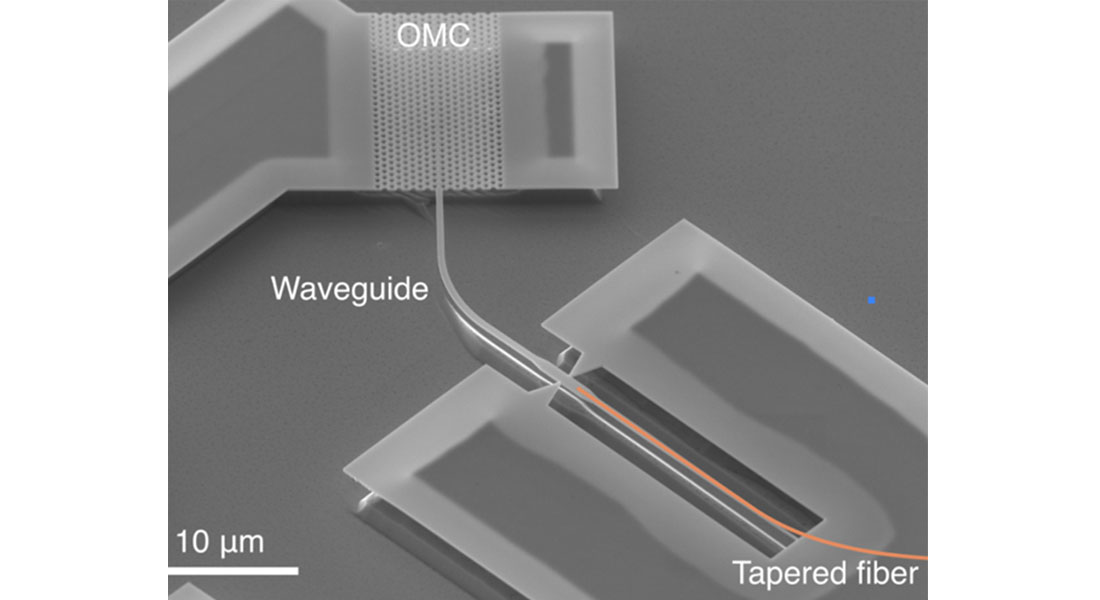Postdoc of Quantum Optomechanics
The Quantum Optomechanics group at the Niels Bohr Institute, Faculty of Science, University of Copenhagen, is seeking a postdoctoral fellow to develop platforms and protocols for mechanical quantum memories, starting from 1 March 2025 or as soon as possible thereafter.

The Project
Our group experiments with nano- and micro-mechanical devices whose unprecedented coherence enables new applications as sensors, memories and transducers.
- Currently, we are seeking a postdoctoral researcher to support our research on optomechanical crystals (OMCs), in which photonic and phononic excitations are co-localized in a nanoscale volume, enabling strong optomechanical coupling.
- The goal of the project is to implement a quantum memory for light in such a device held at low temperatures.
- The postdoc position will also include teaching duties.
- This project is supported by the Danish National Research Foundation.
The Scientific Environment
The Quantum Optomechanics group works at a dynamic research frontier with an international and interdisciplinary team, supported by cutting-edge infrastructure for microwave and optical measurements at the quantum limit, cryogenic platforms down to milliKelvin temperatures, and access to world-class nanofabrication facilities.
The research is embedded in a wide collaboration network, which also provides access to first-class theoretical support. Our work contributes to the Danish Center of Excellence “Hybrid Quantum Networks Hy-Q”.
The larger quantum community at the Niels Bohr Institute provides for a stimulating environment with ample opportunity for interactions, and exposure to international frontier research through visitors and lectures.
We are looking for the following qualifications:
- Professional qualifications relevant to the project
- Relevant publications
- Relevant work experience
- Other relevant professional activities
- Curious mind-set with a strong interest in the physics and engineering of mechanical quantum systems
- Good language skills
Specifically, experience with one or several of the following techniques is an advantage: finite-element modelling of photonic and phononic nanodevices, fiber optics, quantum optical measurement techniques, and sub-Kelvin cryogenics.
General information
Further information on the Department is linked at https://www.science.ku.dk/english/about-the-faculty/organisation/.
- The position is for 2 years.
The University wishes our staff to reflect the diversity of society and thus welcomes applications from all qualified candidates regardless of personal background.
Terms of employment
The position is covered by the Memorandum on Job Structure for Academic Staff.
- Terms of appointment and payment accord to the agreement between the Danish Ministry of Taxation and The Danish Confederation of Professional Associations on Academics in the State.
- Negotiation for salary supplement is possible.
- The application, in English, must be submitted electronically by clicking APPLY NOW below.
Please include
- Curriculum vitae
- Motivation Letter
- Diplomas (Master and PhD degree or equivalent)
- Complete publication list
- Separate reprints of 3 particularly relevant papers
- Contact details of up to 3 references
The deadline for applications is 31 December 2024 23:59 GMT +1
After the expiry of the deadline for applications, the authorized recruitment manager selects applicants for assessment on the advice of the Interview Committee.
You can read about the recruitment process at https://employment.ku.dk/faculty/recruitment-process/.
<< APPLY FOR THE POSITION ONLINE NOW >>
Part of the International Alliance of Research Universities (IARU), and among Europe’s top-ranking universities, the University of Copenhagen promotes research and teaching of the highest international standard. Rich in tradition and modern in outlook, the University gives students and staff the opportunity to cultivate their talent in an ambitious and informal environment. An effective organisation – with good working conditions and a collaborative work culture – creates the ideal framework for a successful academic career.
Emner
Kontakt
The deadline for applications is 31 December 2024 23:59 GMT +1
Inquiries about the position can be made to Prof. Albert Schliesser albert.schliesser@nbi.ku.dk
